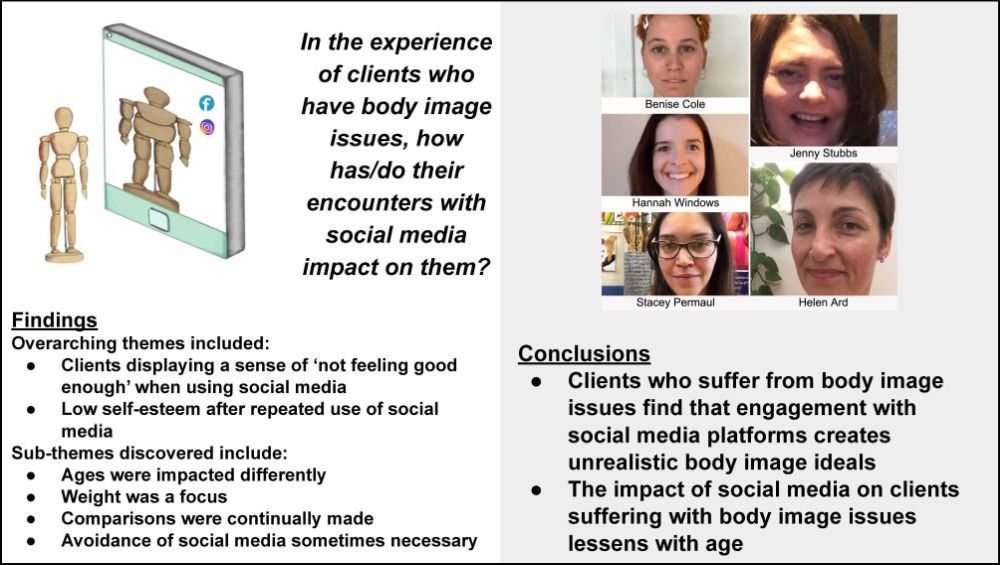
Aim or purpose
The research aim was to explore how encounters with social media platforms impact those with body image issues. The research purpose is to inform counsellors how to better understand and work with this client group.
Design and methodology
Four male/female respondents, identifying as having body image issues, were audio-recorded during semi-structured interviews. Resulting data was thematically analysed informed by phenomenological principals (Smith et al, 2009). We followed BACP ethical guidelines for research in the counselling professions (Mitchels, 2019).
Ethical approval
Submission for ethical approval was made to and granted by the College Ethics Board. Respondents were offered six no-fee counselling sessions, if issues arose, following participation in our research.
Results and findings
Generally, respondents' experienced engagement with social media, adversely impacted how they felt/thought about themselves. Respondents disclosed their negative comparison between their bodies and other social media users. This led participants to make adverse judgments about their own physicality. Additionally, the majority of respondents experienced pressure to look a certain way (like others), which if not attained, resulted in low self-esteem.
An anomaly was identified as one respondent felt his low self-esteem and negative body-image came only from his unresolved intra-personal issues. However, his use of social media platforms had also declined. It appears counselling helped respondents explore their self-judgement/need to make comparisons to others and increased their self-acceptance. As a result, respondents felt that their self-esteem improved. Additionally it seems participants decrease their engagement with social media platforms overtime and with personal maturity.
Research limitations
Due to the limited number of respondents, it might prove difficult to generalise the research findings (McLeod, 2003).
Conclusions and implications
It appears for clients in this group, engagement with social media creates unrealistic body image ideals and leads such clients to negative comparisons with others; in turn, this appears to result in low self-esteem. We suggest that clients in this group might benefit from counsellors’ encouragement to disengage with/decrease social media use. It also appears that the therapeutic alliance is most effective when it allows clients to explore their need to compare themselves with others, helping them to eruditely understand the negative impact of self-judgement and facilitate greater intra-personal self-acceptance.
References
Mitchels, B. (2019) Ethical Guidelines for Research in the Counselling Professions. Leicestershire: British Association for Counselling and Psychotherapy
McLeod,J. (2003) Doing Counselling Research, 2nd Edition. London: SAGE Publications Ltd.
Smith, J., Flowers, P. and Larkin, M. (2009) Interpretative Phenomenological Analysis; Theory, Method and Research. London: SAGE Publications Ltd.
Views expressed in this article are the views of the writer and not necessarily the views of BACP. Publication does not imply endorsement of the writer’s views. Reasonable care has been taken to avoid errors but no liability will be accepted for any errors that may occur.
